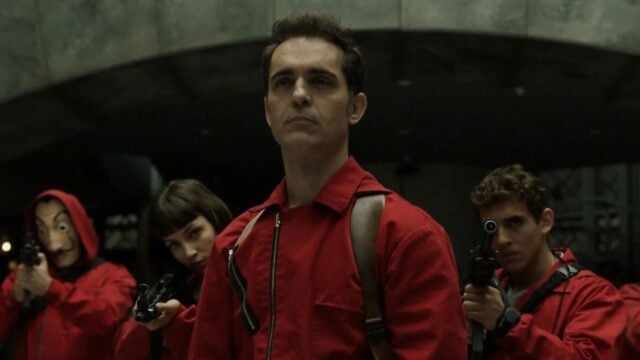Berlin from Money Heist is one of the most popular characters in the series and has gained a loyal fanbase over the years.
He is first introduced in the series as The Professor’s right-hand man and the leader of the robbers during the Royal Mint heist. He plays an important role in the first 2 seasons. In seasons 3 and 4, he appears in several flashbacks as it is revealed that the Royal Bank heist was his brainchild.
Berlin is a mysterious character with several issues. He does some very questionable things in the series, but he is one of the show’s best-written characters, and his absence can be felt in the later seasons.
One of the most mysterious aspects of his character was his illness. Although the nature or degree of his illness is not revealed at first, we realize Berlin is ill when he takes medicines via injections during seasons 1 and 2.
It turns out that the medicine is Retroxil, which is essential for Berlin to survive. Let’s find out more about his illness, its nature, and why he took Retroxil during the heist.
1. Why does Berlin take Retroxil in Money Heist?
Berlin was suffering from a terminal illness called Helmer’s myopathy and had few months to live. He took the medicine Retroxil through injections to control the symptoms of his illness and stay alive for a longer time.

Berlin appears as a ruthless, emotionless narcissist with major anger issues during the Royal Mint heist. However, the series indicates that much of his erratic behavior was a result of his illness, Helmer’s myopathy.
The nature of his illness is not clear, but myopathy is an incurable degenerative muscle disease. We can assume that Berlin’s specific condition led to him having severe mood swings and also controlled his behavior.
It was essential for Berlin to take shots of Retroxil to control his anger and ego. In fact, when Tokyo takes away his medicine to blackmail him into revealing information in season 2, he loses control for a while and struggles to regain it.
Moreover, it was Berlin’s Retroxil medication that enabled the police to find his true identity and tarnish his image in front of the public and the media.
2. Does Berlin die in Money Heist?
Berlin dies at the end of Money Heist. He sacrifices his life to delay the police and let the other robbers escape safely.
By the end of season 2, it is clear that Berlin is behaving ruthlessly because he has nothing to lose. His days were numbered, and he wanted to hold on to some last hope despite knowing he would not make it.

Berlin’s fear of death and his anxiety led him to develop a toxic relationship with a hostage, Ariadna. He assaults her multiple times during season 2 and forces her to die with him at the end of season 2.
However, Berlin’s brave sacrifice proves that he cared for the other gang members and wanted his brother’s plan to succeed. Even after his death, he keeps appearing in seasons 3, 4, and 5 through flashbacks.
Although Berlin knew he would eventually die, he did not want to succumb to his condition. He wanted to die for an important cause. This is the main reason why Berlin decided to stay back to delay the police and sacrifice his life, as he knew he would have to die due to his illness.
Berlin preferred to die while doing what he enjoyed the most: stealing from the rich. His character gets a satisfying end, as his death becomes an epic moment in the series.
3. About Money Heist
Money Heist (Spanish: La casa de papel, meaning “The House of Paper”) is a Spanish heist crime drama television series created by Álex Pina.
The series traces two long-prepared heists led by the Professor (Álvaro Morte), one on the Royal Mint of Spain, and one on the Bank of Spain. The narrative is told in a real-time-like fashion and relies on flashbacks, time-jumps, hidden character motivations, and an unreliable narrator for complexity.
The show focuses on the meticulous plans and the specific contingencies of the Professor who has prepared his group of robbers dressed in red jumpsuits and Dali masks.








No Comments on Why Berlin Uses the Medicine Retroxil in Money Heist